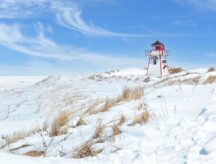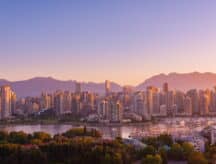16 interesting facts about Canada to celebrate Canada Day
July 1st, 2024, marks Canada Day, signifying 157 years since the passing of the Confederation Act, and the country’s formal creation.
Every year, this day is filled with celebrations throughout Canada, including parades, fireworks, concerts, picnics, and much more.
Did you know for more than 100 years Canada Day used to be called “Dominion Day”? To commemorate this year’s Canada Day, CIC News has compiled the following list of interesting and lesser-known facts about the country.
Discover if You Are Eligible for Canadian Immigration
1. 23% of Canada’s population is foreign-born
Canada boasts one of the world’s most diverse populations, owing largely to progressive immigration policies that date back to at least 1967.
As a result of these significant immigration rates, as of the 2021 census nearly one in four people in Canada were immigrants, born outside of Canada and holding a different citizenship. This is the largest proportion of immigrants in the Canadian population in 150 years and the highest rate of immigrants among all G7 countries.
2. Canada is so big it occupies six time zones
Canada is the second largest country in the world, spanning over 9.9 million square kilometers, or 3.8 million square miles. In addition, the country also boasts the world’s longest coastline, spanning 243,042 kilometers or 151,019 miles.
Such is the size of Canada that the country spans six time zones, including:
- Pacific Standard Time (PST);
- Mountain Standard Time (MST);
- Central Standard Time (CST);
- Eastern Standard Time (EST);
- Atlantic Standard Time (AST); and
- Newfoundland Standard Time (NST).
3. Canada has a museum for immigration
Located at Pier 21 in Halifax, Nova Scotia, the Canadian Museum of Immigration is Canada’s sixth national museum. Packed with features, exhibitions, and events, the museum tracks over 400 years of immigration to Canada—telling the stories of Canada’s immigrants. Musuem-goers can even trace their own family’s history of immigration through Canada, with the help of the Scotiabank Family Center.
The museum is located at Pier 21 due to the site’s prominence in Canadian immigration. Between 1928 and 1971, close to one million immigrants landed in Canada at the pier.
4. Canada has the largest moose population in the world
While Canada’s national animal is the beaver, the country is often noted for its other wildlife as well, including polar bears, wolves, narwhals, and of course, moose.
The country boasts the world’s mightiest moose population, ranging from 500,000 to 1,000,000 individuals nationally. Moose can be found in almost every province and territory in Canada.
5. Canada’s national sport is hockey...and lacrosse
While often associated with the sport of hockey, Canada actually has two national sports. Per the National Sports of Canada Act, while ice hockey is recognized as Canada’s national winter sport”, lacrosse is the country’s national “summer sport” of Canada.
Canada performs exceptionally in both sports, ranking highly in international competition.
6. Surprising Canadians
While only boasting a population of 41 million people, Canadians can often be found at the apex of their fields across industries and subjects. Some examples of influential people you might not guess are Canadians are:
- Alexander Graham Bell;
- James Cameron;
- Guy Laliberté (Founder of Cirque du Soleil);
- Joni Mitchell;
- Elliot Page;
- Shania Twain;
- Margaret Atwood; and
- James Naismith (creator of basketball).
7. Over half of the world’s lakes are in Canada
Canada boasts more lakes than anywhere in the world. In fact, according to Statistics Canada, the country has access to over 20% of the world’s surface freshwater, and 7% of the world’s renewable water flow.
Canada is estimated to be home to close to 2 million lakes. Among these lakes is “Pekwachnamaykoskwaskwaypinwanik”, a lake located in the province of Manitoba. The lake boasts the longest place name in Canada (31 letters), which translates from the Cree language to “where the wild trout are caught by fishing with hooks”.
8. Canada’s national parks are larger than many countries
38 National parks are contained within Canada, spanning more than 340,000 square kilometers (131,274 square miles) in total. This massive landmass covers approximately three percent of the country’s total landmass.
In comparison the total size of Japan is 377,000 kilometers, while Germany spans 357,000 kilometers—making Canada’s national parks cumulatively as large as either of these countries.
9. 90% of Canadians live within 100 miles of the U.S.-Canada border
While literally the second largest country in the world, Canada is also densely populated relative to its overall size.
90% of Canada’s population (36.9 million people) live within just 100 kilometers (about 62.14 mi) of the country’s Southern border.
10. Canada is the second-most educated country in the world
According to data from the Organization for Economic Cooperation and Development (OECD), Canada has the second most-educated population in the world.
The OECD measures the proportion of populations that have completed tertiary education (which is defined as the proportion of the population that has completed that highest level of education, by age group.
Canada is surpassed only by South Korea, which is the most educated country in the world today.
11. Canada produces most of the world’s maple syrup
In 2021, Canada produced more than 100 million kilograms of maple syrup nationally. The country boasts over 6,000 maple farms and more than 54 million maple taps cumulatively; making it a powerhouse in the world of maple syrup production.
Unsurprisingly, maple syrup can be a lucrative business in Canada, and can even be the subject of scandal. In 2012, an investigation led to the discovery of significant theft of maple syrup —3,000,000 kilograms (or 3,000 tonnes) to be exact—from a storage facility in Quebec. The approximate valuation of the maple syrup stolen, when adjusted for inflation, was $24.1 million CAD—making this the most valuable heist in Canadian history. The six culprits were arrested in December of the same year.
12. Canada has the longest street in the world
Yonge Street is located in Toronto, Canada, and boasts the title of the longest street in the world. Named after Sir George Yonge, the former British secretary of war, the street is one of the oldest in all of Canada, dating as far back as 1794.
Yonge Street’s length has been called into question, with critics citing that the street is often conflated with Ontario Highway 11 when taking measurements—artificially increasing its length. Regardless, even when disregarding Ontario Highway 11, Yonge Street measures 56 kilometers (about 34.8 mi) in length, comfortably making it the world's longest.
13. The coldest ever temperature recorded in Canada was –63°C
Recorded in 1947, at the village of Snag, in the Yukon Territory—Canada’s coldest ever-recorded temperature was –63°C (-81.4°F).
For reference, according to the government of Canada, at –27°C individuals risk windburn (excessive dryness, redness, and soreness due to the wind eroding the top layer of oil on the skin), frostbite and hypothermia.
14. Canada has a $1 million coin
The aptly named “Big Maple Leaf” is a gold coin produced by the Royal Canadian Mint in 2007—and valued at $1 million CAD. In fact, the Royal Mint created five of these coins at their Ottawa facility.
The coin weighs 100 kilograms but is only 530 millimeters (about 1.74 ft) in diameter. The Big Maple Leaf is also noted for its unparalleled gold purity (99.999%) in the Guinness Book of World Records.
As of March 2017, one Big Maple Leaf is valued at $4 million USD ($5.4 million CAD).
15. Canadian innovation
Throughout their history, Canadians have made significant contributions to the world through the inventions and innovations they pioneered.
Some of the most impactful Canadian inventions include:
- Java programming language;
- Sonar;
- The alkaline battery;
- The garbage bag;
- Insulin;
- The artificial cardiac pacemaker
- Film colorization;
- The Ambrosia apple;
- The California roll; and
- Hawaiian pizza.
16. Canada and Denmark had been at war from 1973 to 2022
The Whisky War (also known as the Liquor War) is a bloodless war between the King of Denmark, and Canada over Hans Island. Between 1973 and 2022, the island was disputed between Canada and Denmark, though never resulting in direct conflict or violence.
In 1984, Canadian soldiers placed a Canadian flag and a bottle of Canadian whisky on the island. Later that same year, the Danish Minister of Greenland Affairs came to the island with a Danish flag and a bottle of Schnapps.
This would begin a mighty exchange of flags and alcoholic beverages as both countries sought a (comedic) supremacy of the island. In 2022, the “conflict” was finally resolved, with the implementation of a land border across Hans Island—making it so that Canada and Denmark technically share a land border now.
- Do you need Canadian immigration assistance? Contact the Contact Cohen Immigration Law firm by completing our form
- Send us your feedback or your non-legal assistance questions by emailing us at media@canadavisa.com







